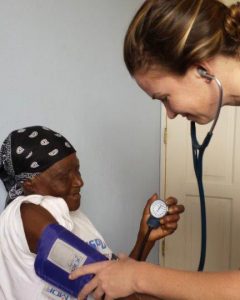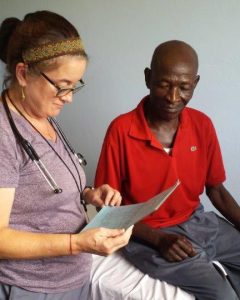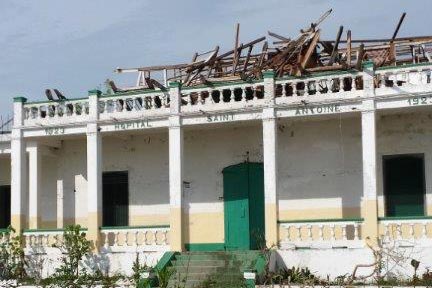Earlier this fall, Dr. Susan Levine, UConn Health primary care physician, and Dr. Jessica Lozier, an internal medicine resident, spent nearly two weeks in the Haitian city of Jeremie, which was devastated by Hurricane Matthew. The following is Levine’s account of her experience there.
Having done emergency relief work in Haiti shortly after the earthquake and again with cholera, I thought I had a perspective on the importance of sustainability and capacity building. When the opportunity instead to work directly for the ministry of health in the understaffed St. Antoinne Hospital in Jeremie recently presented itself, I never expected the unique perspective that would follow.

Jessica Lozier, an internal medicine resident, and I arrived in Jeremie days after Hurricane Matthew devastated much of the southwestern portion of the country. Our assignment was to support the St. Antionne Hospital. With downed power lines at every turn and frequently impassable roads, conditions were desperate. The entire medicine ward of the hospital was in fact missing. We helped the few Haitian doctors there care for a wide range of hospitalized and emergency room patients. The conditions we treated ranged from typhoid and malaria, dysentery and pneumonia to tragically tetanus and sepsis. Resources are desperately lacking.
Despite the overwhelming array of life-threatening illness, stories of resilience and caring emerged. The dedication of a skilled Haitian internist, Dr. Charles Ronsand, and the tireless efforts of a forceful leader and head nurse, Miss Pierre, will be forever etched in my memory. A critically ill man offering food to an orphaned teenage boy in the adjoining bed was one of many examples of the humbling dignity with which Haitians survive. These stories and experiences to me were both heartbreaking and inspiring all at once.

Because the Haitian government has opted not to declare a national state of emergency, there has not been to date a significant influx of foreign aid to assist in the hurricane relief effort. In many respects Hurricane Matthew has the potential to create a hunger crisis soon of epic proportions and yet little mention of this crisis has made its way to the U.S. media. The destruction of many of the seasonal crops may soon cause a countrywide famine. While an influx of foreign nongovernmental organizations might seem a natural solution, the lessons learned by Haiti from the post-earthquake era are that foreigners insensitive to the local culture and/or unfamiliar with the local economic standards have inflated prices to unsustainable rates, doing more long-term damage than good.
What Haiti needs now is food that can be distributed locally in amounts that are adequate for the local need, while at the same time, a Haitian-led focus on regrowing damaged crops.
I am eternally grateful to the Haitian doctors we worked with and the patients we treated together for providing me with the perspective and context to increase the efficacy of my own small contributions to global health.



